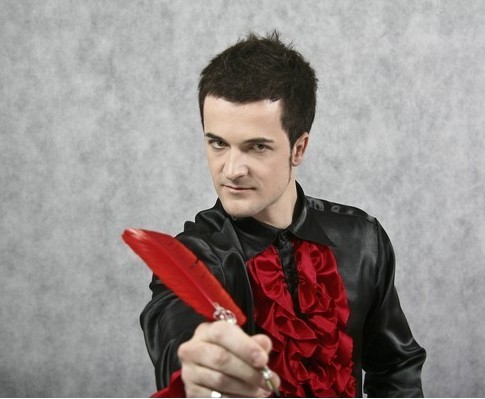 |
|
Christophe Hisquin |
Christophe Hisquin got the "China bug" at school in Lyon and, after toying with being a professional tennis player, he came to Shanghai for language study and is now carving out a musical career. Careers don't come in a more unstable package than singing and songwriting. But Frenchman Christophe Hisquin took the alternative career a step further - he is writing and singing songs in both Chinese and French. Even he reflects that it's "kind of crazy."
From slow hard beginnings, Hisquin, who now only uses his stage name Dantes or Dai Liang, is carving out a niche for himself in the Chinese entertainment industry and hoping to make it big.
Dantes' day is filled with appointments - particularly TV appearances ranging from Shanghai's local family shows to Beijing's CCTV. He has taken part in singing contests, game shows and presenting. His proudest appearance was on the 2005 Spring Festival Gala Show, a national institution in the hearts of Chinese.
These days foreigners who speak fluent Chinese are no longer all that rare. But Dantes combines language skills with original songwriting. Not only does he mix Chinese lyrics with French, he also mixes Chinese melodies and Peking Opera with Western influences.
Always partial to a good ballad, Chinese audiences have embraced this cultural and musical milieu.
"In Europe, it's so hard to get into the music industry, but I came here and approached a record company and they said let's try," says Dantes. "Here I feel like I'm totally free and not enchained."
Dantes first got the China bug as a middle school student in Lyon. Always adventurous, he wanted to pick up an "exotic" language and the school offered Chinese. As a fan of kung fu, Dantes took the course and it became a lifelong interest, along with music.
As a teenager, he came to a fork in his life. He was a very promising tennis player and was drafted into a professional club. But as he became more serious about the sport, he also became more aggressive and competitive. Eventually his parents decided it was not a good life for him and he quit the club at the age of 16.
In 2000, Dantes came to Shanghai to study Chinese for a year. It was during this time he first came into contact with the Chinese media. Since they were an early batch of foreign students in China, TV stations visited his class to cast foreigners for parts in productions.
After that year he went back to France to make his first record. In 2004, Dantes moved back to Shanghai to study for a PhD in the Chinese music industry and to pursue a music career.
Do his parents prefer his current career to professional tennis?
"They thought it was crazy," he replies. "My father is a businessman and very pragmatic. So many people have given up in music and they were afraid I would be disappointed. They thought with a PhD I should be a teacher."
When he first started in 2004, Dantes made little money and times were hard. It was only in the last three years that he has gained some level of recognition. But he says the hard times never felt that bad for him.
"I didn't care because it was always about the music for me, not money. I told friends and family don't worry about me," says Dantes. "Actually the hardest thing was dealing with people who were only in it for money - mostly managers and events companies. But I adapted."
He has since released two more CDs and played over 100 concerts to promote his music. As well as national TV appearances, Dantes plays small clubs and venues.
"I really like the fact that I can be both underground and mainstream at the same time," he says.
Now his Portuguese wife is his manager. She speaks eight languages including Chinese, Russian and Hebrew.
Dantes' music is influenced by "Brit pop" bands such as Oasis and French chanson. Chinese music, he says, uses more traditional melodies and elements such as Peking Opera.
As a fan of Kunqu Opera and ethnic Miao music, he wants to experiment with these music forms in future as French pop music very rarely uses traditional elements.
"The main difference between Chinese and European music industries is that here performances are more important than the CD," he reflects. "I like to perform a lot, but for me the CD is still a sacred thing - it proves I can write and sing."
Even his stage name is in homage to the first time he performed in public in Athens. Dantes is a very old name which was chosen in honor of ancient Greek history and also because it sounds French as well as Spanish.
And how do audiences respond to his music?
"My audiences are very international. Chinese and Americans usually say 'Great, we love it.' But the French are a bit more pessimistic and will suggest changes here and there," he smiles.
(Shanghai Daily September 2, 2009)